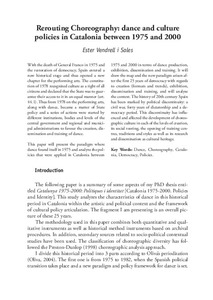Rerouting Choreography: dance and culture policies in Catalonia between 1975 and 2000
Estudis escènics: quaderns de l'Institut del Teatre. 2015, Núm. 41-42
Document typeArticle
Abstract
With the death of General Franco in 1975 and the restoration of democracy, Spain entered a new historical stage and thus opened a new chapter for the performing arts. The constitution of 1978 recognized culture as a right of all citizens and declared that the State was to guarantee their access to it in an equal manner (art. 44.1). Thus from 1978 on the performing arts, along with dance, became a matter of State policy and a series of actions were started by different institutions, bodies and levels of the central government and regional and municipal administrations to favour the creation, dissemination and training of dance. This paper will present the paradigm where dance found itself in 1975 and analyze the policies that were applied in Catalonia between 1975 and 2000 in terms of dance production, exhibition, dissemination and training. It will draw the map and the new paradigm arisen after the first 25 years of democracy with regards to creation (formats and trends), exhibition, dissemination and training, and will analyse the context. The history of 20th century Spain has been marked by political discontinuity: a civil war, forty years of dictatorship and a democracy period. This discontinuity has influenced and affected the development of choreographic culture in each of the levels of creation, its social rooting, the opening of training centres, traditions and styles as well as its research and dissemination as cultural heritage.
Access conditionsOpen Access
KeywordsDansa, Coreografia, Catalunya, Democràcia, Polítiques
ISSN2385-362X
,
0212-3819


